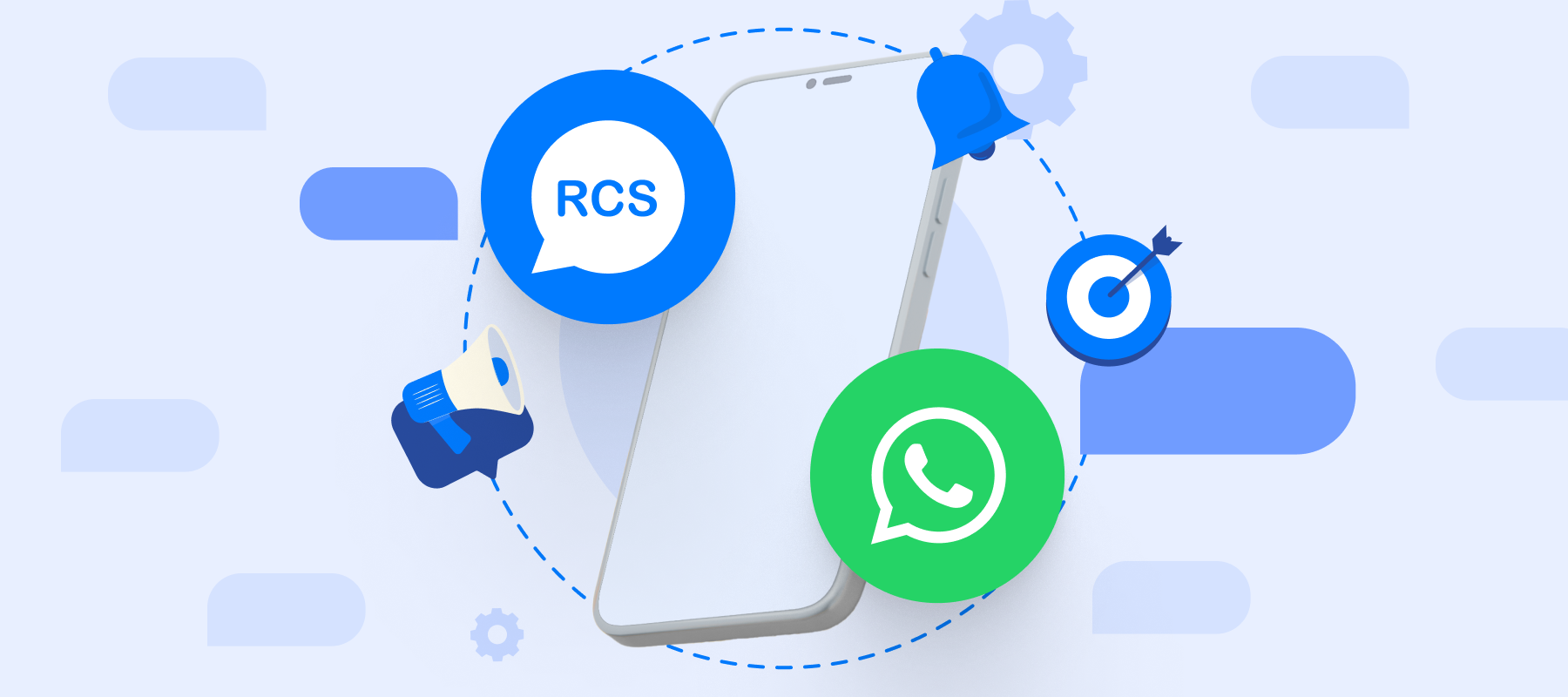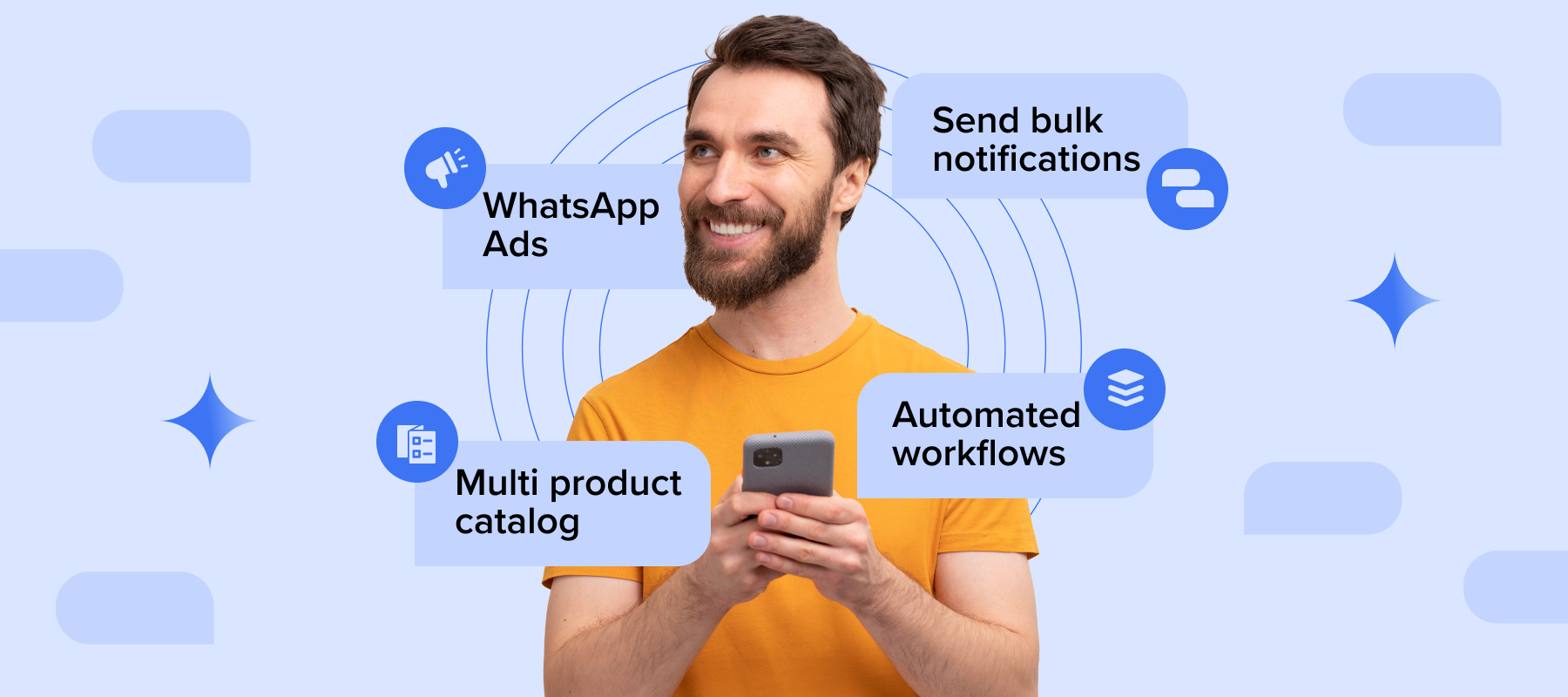Introduction
Business messaging has changed the way companies engage with their customers, making conversations personalized and accessible on-demand. With customers wanting seamless and engaging experiences, channels like Rich Communication Services (RCS) and WhatsApp are leading the way with their sophisticated features and visually-engaging UIs. Moreover, both platforms enable businesses to reach their audiences at scale while offering everything from real-time support to dynamic promotional campaigns.
RCS and WhatsApp shine in unique ways. In this article, we unpack the key differences between RCS and WhatsApp, highlighting the benefits, and how they might align with your business goals. Whether you’re looking to harness the rich capabilities of RCS or leverage WhatsApp’s larger audience base, both channels offer the tools to elevate your business messaging strategy to new heights.
EXPLAINED: What Is RCS Messaging and What It Means for Your Business?
RCS business messaging represents the future of business messaging, offering businesses a way to engage customers with dynamic, interactive experiences directly through their default messaging app. Unlike traditional SMS, RCS combines the simplicity of text messaging with the rich capabilities of modern digital communication, enabling features like images, videos, carousels, and interactive buttons – integrated within a single chat interface.
One of the standout advantages of RCS is its ease of adoption. Since it works on native messaging apps without requiring an external application download, businesses can seamlessly connect with audiences already using their smartphones. RCS is an excellent channel to engage customers at various stages of their journey – from onboarding new users and guiding purchase decisions to delivering after-sales support.
RCS also shines with its ability to provide visually engaging conversations. Businesses can share product catalogs, run promotions, or even facilitate transactions without redirecting users to a third-party platform. This reduces friction in the customer journey and enhances their overall experience. Additionally, the two-way messaging enabled by RCS, ensures customers feel heard and engaged, fostering stronger relationships.
Whether you’re launching personalized campaigns, looking to improve customer service, or provide timely updates, RCS Business Messaging blends functionality with accessibility. For businesses aiming to stay ahead of the curve, RCS offers a powerful way to connect with customers on a deeper level.
EXPLAINED: How WhatsApp Streamlines Business Messaging, and What It Means for You?
Meta has transformed WhatsApp from a simple messaging app to a powerful business communication platform that connects businesses with their customers more effectively than ever. Testament to it is the fact that 175 million people message businesses daily. WhatsApp offers a seamless and direct channel to connect, engage, and build relationships with their audience.
Businesses can harness Click-To-WhatsApp Ads (Ads That Click to WhatsApp) to initiate conversations with prospects on Facebook and Instagram, directing them to WhatsApp for personalized conversations at scale. Imagine a popular fashion retailer gearing up for Black Friday. They launch a Click-to-WhatsApp Ad campaign on Facebook and Instagram, showcasing exclusive deals like “50% Off on Winter Collections” or “Buy 1, Get 1 Free on Accessories.”
When a user clicks on the ad, they are directed to WhatsApp, where they instantly receive a personalized message like:
“Hi there! Thanks for checking out our Black Friday deals. Let us help you find the perfect outfit. Do you have something specific in mind?”
From there, the retailer can guide the customer through their product catalog, provide recommendations based on preferences, and even process orders. By leveraging Ads That Click to WhatsApp, the retailer can create timely, engaging conversations that not only drive sales but also enhance the shopping experience.
WhatsApp Flows is another game-changing feature, creating an in-app experience that allows businesses to design complex, interactive customer journeys. By enabling customers to navigate appointment booking, updating account information, or processing payments without leaving the chat, WhatsApp Flows enhance efficiency and improve user satisfaction.
With WhatsApp Flows, businesses can set up customizable, interactive flows that guide users step-by-step through specific tasks. Customers simply follow prompts, make selections, and complete actions in a conversational manner, removing the need for multiple touchpoints or switching platforms.
Imagine a food delivery business using WhatsApp Flows to simplify the ordering process.
– A customer messages the business to order food.
– WhatsApp Flow is triggered, prompting the customer to select options:
– Cuisine (e.g., Indian, Italian, Chinese)
– Dish Preferences (e.g., vegetarian, non-vegetarian, spicy levels)
– The flow displays the restaurant’s menu based on the selected preferences.
– The customer chooses items, confirms the order, and pays directly within the chat.
Interakt, a leading WhatsApp Business API provider and full-stack WhatsApp CRM, streamlines WhatsApp Business messaging with customizable plans for businesses of all sizes and industries.
Key Differences Between RCS and WhatsApp Messaging
| RCS Business Messaging | WhatsApp Business API | |
|---|---|---|
| Platform | Operates through mobile carriers, requiring a compatible Android device. RCS is soon to launch on iOS too. | An offering by Meta, accessible on all devices with WhatsApp. |
| Adoption and Reach | RCS currently has 1.4 billion users, and the platform is accessible on Android and soon to be launched on RCS. | Universally adopted by more than 3 billion monthly active users. |
| Rich Media Support | Supports images, videos, carousels, and quick actions directly within the messaging app. | Offers rich media features such as multimedia, quick replies, buttons, and catalog integration. |
| Interactive Features | Allows advanced interactions like suggested replies, location sharing, and payments. | Integrates advanced capabilities like WhatsApp Flows, Click-To-WhatsApp Ads, and templates. |
| Pricing | Pricing varies by carrier and depends on volume and region. | Transparent pricing via WhatsApp Business API, charged as per tier of conversations (Marketing, Utility, Authentication, Service). |
| Integration | May require carrier or device-specific customization for business use. | Seamlessly integrates with CRM tools, marketing platforms, and eCommerce systems. |
| Security | Relies on carrier-level encryption; less consistent security protocols. | End-to-end encryption ensures secure conversations for all users. |
| Other Features | Lacks built-in analytics and advanced automation; relies on carrier support for updates. | Offers extensive business tools, including detailed analytics, automation, and customer journey mapping. |
RCS vs WhatsApp: Key Facets to Consider for Businesses
| RCS Business Messaging | WhatsApp Business API | |
|---|---|---|
| Branding and rich media | Rich media such as images, carousels, and videos are natively supported. Messages also have sender ID, verified badge, and other branding elements to drive trusted, reliable conversations. | It lacks deep brand options, although that’s compensated by the availability of rich media support for images, videos, documents, carousels, and more. |
| Reach and accessibility | RCS relies on carrier infrastructure, and it’s integrated within the default messaging app of Android devices. | WhatsApp Business API does not rely on carriers or the platform (Android or iOS). In fact, access to the API allows businesses to engage with users on Android, iOS, and web platforms |
| Customer experience | Depends on carrier’s capabilities, and features specific to Android and iOS platforms. | Offers a consistent experience on all supported platforms, enabling businesses with dependable message delivery, media sharing, and app-like experiences through Flows. |
How to Choose the Right Platform for Your Business
RCS Business Messaging and WhatsApp Business API offer unique advantages depending on the business needs and target audience.
RCS is suitable for businesses operating in regions with strong carrier support, offering low latency and fast message delivery. It benefits from lower costs, particularly in regions where carrier support is robust, making it an attractive option for enterprises looking to optimize messaging costs. Plus, it allows for rich media, branding, and customization. While it is suited for large enterprises, its effectiveness hinges on widespread carrier adoption and network reliability, which can vary across regions.
On the other hand, WhatsApp Business API is known for its immense global reach, making it an ideal choice for businesses targeting a diverse and widespread customer base. WhatsApp is platform-agnostic and can be accessed on any device with internet connectivity, without the dependency on specific carriers or network infrastructure. Its key strength lies in its extensive data security, with end-to-end encryption ensuring that all customer interactions are kept private and secure. WhatsApp also adheres to global compliance standards like GDPR, HIPAA, and CCPA, making it suitable for businesses in regulated industries.
The API is highly flexible, with robust integration capabilities that allow businesses to connect it seamlessly with CRM systems, customer support platforms, and marketing tools, making it a great fit for businesses of all sizes. Additionally, WhatsApp offers high throughput for messages, ensuring smooth communication without delays, even for large-scale campaigns.
Conclusion
When comparing RCS Business Messaging and WhatsApp Business API, both platforms offer distinct advantages tailored to different business needs.
RCS shines with its ability to deliver rich, branded messaging experiences directly within the native messaging apps, benefiting from lower costs in specific regions and its enterprise suitability. However, its dependency on network infrastructure and carrier adoption can limit its global scalability and flexibility.
On the other hand, WhatsApp Business API offers unparalleled reach, robust security, and seamless integration capabilities, making it a versatile solution for businesses across various industries and regions. Its platform-agnostic nature and high message throughput are a boon for businesses with diverse customer bases and high-volume messaging needs.
Ultimately, the choice between RCS and WhatsApp Business API comes down to your business goals, target audience, and, to some extent, the infrastructure. While both platforms offer enormous value, understanding your unique needs and how each platform aligns with those will streamline the decision-making, and help elevate customer engagement and business outcomes.








